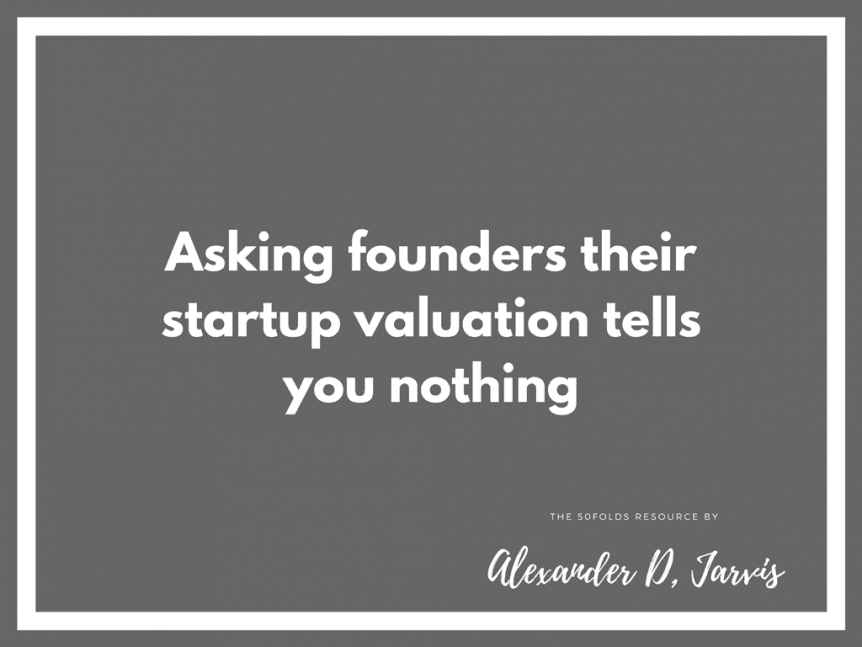Tl;DR: Startup valuation methods don’t work because founders aren’t generating revenue. The real way to figure out your valuation is to calculate how much you need to raise to get to your next round and what dilution you will accept.
“What’s your valuation?”
Perhaps you:
- Want to low-ball the founder so you can get a good deal?
- Save time by figuring out if founders have unreasonable expectations on valuation, so there is no point in talking more?
That’s fine if you have well-defined logic, but I don’t think it makes sense:
- If the founder is dumb enough to be low balled they’re not going to perform anyway
- Expectations are important sure, but you can learn more by waiting a little longer
You learn very little from that question. What you want to know is:
- How smart is this founder?
- Do they have strong logic abilities?
- Do they have a plan?
You can get the basic info and hell of a lot more if you ask probing questions.
The better question has two parts:
- How much do you need to raise to hit your milestones?
- What dilution are you targeting in this round?
Why startup valuation methods (at early stage) don’t make sense
When startups are at a later stage, sure there are metrics. Bessemer track public SaaS multiples which can be a benchmark (though need some adjustments). Here is an example of what that would look like:

5x their shite all revenue is shite all.
When founders are selling hope and rainbows, they don’t have meaningful numbers. Their valuation is based on their potential (and sales ability).
So you need to figure out how to value ‘potential.’ Let’s face it. You can’t.
How startup valuation really work
There is a formula for valuation. It’s this:
Valuation = Investment / Investor ownership (Dilution)
So if you agree on a valuation of $10m post, your investment is $2m and the dilution is 20%.
Only a dumb founder would give up 50% of their startup in one round, right? Yeah, fucked cap table.
But they should be ‘happy’ to give up maybe 20% for the right suitor. Maybe 15% is ok, 25% they can live with… but no more.
Now they need investment. They calculate around $2m, but could be more or less. That sort of depends on you ;).
So we can map this out and see a range of post-money valuations (in $000s):

On this basis, the valuation is between $4m and around $13m. That’s a big range. You may be price sensitive.
To tighten this up, you could argue they will achieve more with a larger raise, so you think they should take $2m. The range is, therefore, $8m to $13m post.
So startup valuation comes from how much you will invest and what dilution the founders will accept. It’s an output range rather than an input.
Learning more
What you want to hear is:
“According to our calculator, we need $2m. We are targeting a dilution of around 15%.”
You do some basic math and figure out the valuation range in your head.
Then you ask them to explain the logic.
- How did they come up with $2m?
- How long is the runway?
- What milestones will you achieve?
- etc etc
If they have well-formed answer then you learn a lot about the founders. And if you are dealing with great founders then they get the opportunity to differentiate themselves.
Asking the valuation and them responding “$13m post” and gazing at you whilst trying not to flinch tells you nothing.
Founders have no clue why their valuation is $13m. There are also no benchmarks. All you learn is if they under or over value themselves.
Do you understand why startup valuation methods don’t make sense now?



Comments 2
No comment on how anyone can possibly get $2M from an angel investor. I am targeting $100K.
Author
Jason-
I think your statement is a poignant, grounding reminder of how hard it is to make $1, let alone $2 MILLION!
I totally can understand. If you are new to ‘startup raising’ numbers can see ridiculous. I am certainly numb!
Issue is that $100k doesn’t go far. If it is you in your basement covering server costs, then sure, it’s a god-send! But it can be hard to hire someone for $100k these days. So $2m goes quickly if you hire a few people, let alone other costs.
Few ‘angel investors’ write $2m checks. A $2m investment typically comes from many investors (though 30-60% can come from one party).
If you have specific questions or concepts you do not understand, let me know. I’d be happy to clarify.
I think the issue is that you don’t understand how the investment into startups game works. It’s moronic, but it makes sense once you do.
Alexander